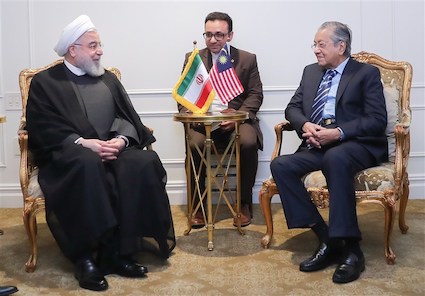Malaysia helping Iran to evade economic sanctions

(The Jerusalem Post) – The US, and not Israel, will need to take the lead on combating attempts by Iran to circumvent its sanctions via Malaysia, former Mossad chief Danny Yatom told The Jerusalem Post on Monday.
“Israel can utilize its connections both revealed and clandestine, including the Mossad and Foreign Ministry” to help gather intelligence “to give to the Americans…but an international power” like the US must take the lead in combating the phenomenon.
With a May 2 deadline looming, in which the US has announced it will not grant any waivers from its anti-Iran nuclear-program sanctions, there is increased attention on how the Islamic Republic may try to circumvent the sanctions.
The US hopes that its sanctions and pressure campaign will convince Tehran to agree to additional concessions relating to its nuclear program and military activities, though Iran has showed every sign that it will seek to undermine the sanctions.
Some of Tehran’s methods to try to circumvent US sanctions, which are enabled by China and Russia, have gotten more attention – but some smaller countries like Malaysia can also play a big factor and may become more important at this new stage.
Yatom’s point was that unlike Syria, Iraq and Iran itself – where the Mossad has publicly admitted to some massive penetrations and remained silent about other possible penetrations – Israel cannot project the same intelligence penetration in a faraway country like Malaysia the way that the US might be able to.
In contrast, many experts say that the Mossad’s penetration of nearby Middle Eastern countries exceeds the US’s abilities.
Regarding the Iran-Malaysia connection, in November 2018, the British media reported that British businessman Alexander George was sentenced to two-and-a-half years in prison for smuggling military hardware, including Russian MiG and US F4 Phantom parts to Iran via companies he owned in Malaysia.
Past reports by the US government have indicated extensive relations between Iran and Malaysia’s government-owned national oil company, Petronas, to jointly explore gas fields.
Last week, Haaretz reported that Western intelligence sources have said that Iran and Malaysia have woven an alliance which enables Tehran to evade economic sanctions. Oil tankers seen sailing in atypical numbers between the two countries was given as an example.
Dating back to 2011, Time magazine had reported that there were 60,000 Iranians studying, working or waiting for visas in Malaysia. This volume of population exchange means it is easy for Iranian intelligence operatives to find undercover reasons for traveling between Iran and Malaysia to carry out clandestine activities.
With Iran and Hamas often working together, there is also a potential Iran-Malaysia-Hamas connection.
As of 2015, the Meir Amit Intelligence and Terrorism Information Center had highlighted two instances of Hamas’ military-terrorist wing activity in Malaysia.
In one instance, the indictment of Wasim Qawasmeh of Hebron led to the revelation that he was recruited by Hamas’ Izz al-Din al-Qassam Brigades in Malaysia, along with other Palestinians from the West Bank studying there.
During the 2014 Gaza War, the interrogation of a Hamas terrorist captured by the IDF near Khan Yunis, revealed that Hamas’ military wing recruited him and sent him to Malaysia with nine other operatives to train to use hang gliders for carrying out terrorist attacks.
The Meir Amit center’s 2015 report said that “the local Malaysian authorities turn a blind eye to Hamas’ activity, or even allow it, despite the denials issued by both the Malaysian government and Hamas after Israel publicized the information.”
According to foreign reports, the Mossad has been active in Malaysia, including assassinating Hamas electronic engineer Fadi Muhammad al-Batsh in April 2018 in a drive-by motorcycle shooting near a mosque in Malaysia on Saturday.
Batsh had been identified as a Hamas expert both for designing drones and rockets.
Al-Batsh’s assassination, if it was carried out by the Mossad, could very well line up with the December 15, 2016, assassination in Tunis of Muhammad al-Zawari – also credited by most to the Mossad.
Zawari was an aeronautical engineer who manufactured drones for Hamas, and possibly also for Hezbollah.
However, Yatom said accusations that the Mossad had carried out the assassination were speculation and that Batsh had many potential enemies.

